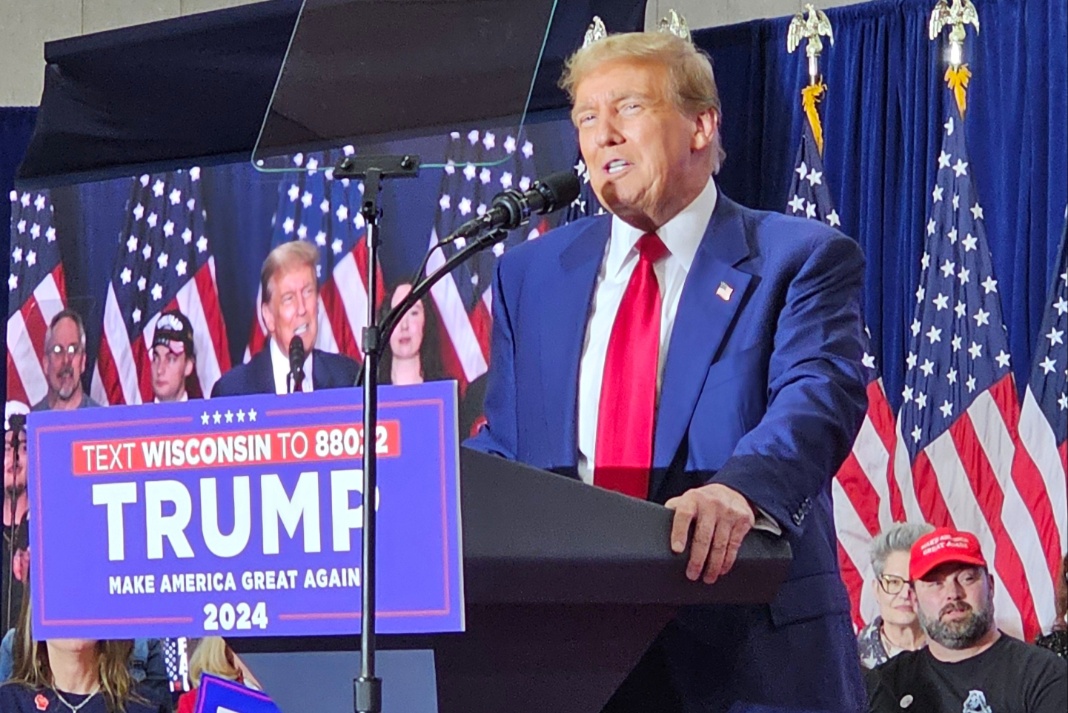This post originally appeared at https://www.wisconsinrightnow.com/five-key-questions-ahead-of-trumps-first-criminal-trial/

Jury selection is set to begin Monday in the first-ever criminal trial of a former U.S. president.
Former President Donald Trump has pleaded not guilty to 34 felony counts related to charges he paid hush money to adult film actress Stormy Daniels through a lawyer and covered it up as a legal expense before being elected president.
Trump has attempted to delay the start of the New York state trial several times, including three longshot tactics judges rejected this week.
What charges does Trump face in the New York hush money case?
Manhattan District Attorney Alvin Bragg has charged Trump with 34 counts of falsifying business records related to money paid to Daniels and another woman, former Playboy model Karen McDougal. Bragg has alleged Trump broke New York law when he falsified with the intent to commit or conceal another crime.
Prosecutors allege Trump falsified internal records kept by his company, hiding the true nature of payments that involve Daniels ($130,000), McDougal ($150,000), and Trump’s former personal lawyer Michael Cohen ($420,000). Prosecutors allege the money was logged as legal expenses, not reimbursements. Both Cohen and Daniels are expected to testify.
Cohen is expected to be a key witness in the trial. Daniels has said she expects to testify.
Former Manhattan District Attorney Cyrus Vance Jr., Bragg’s predecessor, did not bring the case to trial.
What happens on Monday?
Prosecutors, defense attorneys and Donald Trump are expected to be present when the trial before Judge Juan Merchan gets started Monday. The first step will be picking a jury, a process that could take a week or more depending on how things progress. The trial is expected to last six to eight weeks.
Prosecutors and defense attorneys will select 12 jurors and six alternates from a pool of potentially hundreds of people. Each juror will answer 42 questions designed to determine if they can be impartial in the high-profile trial of a polarizing former president. The jurors will remain anonymous because of security concerns.
Once a jury is seated, it’s on to opening statements where prosecutors and defense attorneys will get to address the jury about what they plan to show during the trial.
What is Trump’s defense to the charges?
Trump has maintained he did nothing wrong and has accused Bragg of bringing a politically motivated case involving conduct in 2016 during a presidential election year as Trump faces incumbent Joe Biden in a rematch of the 2020 election.
Trump has spoken out against the judge, the district attorney and other involved in the case repeatedly. Trump’s comments prompted a gag order from the judge who said Trump can’t talk publicly about certain people involved in the case and their families.
“The White House Thugs should not be allowed to have these dangerous and unfair Biden Trials during my campaign for President. All of them, civil and criminal, could have been brought more than three years ago. It is an illegal attack on a Political Opponent. It is Communism at its worst, and Election Interference at its Best. No such thing has ever happened in our Country before,” Trump wrote on his social media platform Truth Social this week. “On Monday I will be forced to sit, GAGGED, before a HIGHLY CONFLICTED & CORRUPT JUDGE, whose hatred for me has no bounds. All of these New York and D.C. ‘Judges’ and Prosecutors have the same MINDSET. Nobody but this Soros Prosecutor, Alvin Bragg, wanted to take this ridiculous case. All legal scholars say it is a sham. BIDEN’S DOJ IS RUNNING THE CASE. Just think of it, these animals want to put the former President of the United States (who got more votes than any sitting President!), & the PARTY’S REPUBLICAN CANDIDATE, IN JAIL, for doing absolutely nothing wrong. It is a RUSH TO THE FINISH. SO UNFAIR!”
Will Trump take the stand?
That’s not clear yet. Trump said last month that he’d be willing to testify at trial if needed.
Could Trump go to jail?
It’s too earlier to tell what will happen if Trump is convicted. Under New York state law, falsifying business records in the first degree is a Class E felony that carries a maximum sentence of four years in prison.
Trump’s age and lack of any prior criminal convictions could work in his favor at sentencing if he’s convicted. His attacks on the judge could have the opposite effect at sentencing. Before sentencing, the judge would look at sentencing guidelines, recommendations from prosecutors and any other pre-sentence reports.
In late March, Trump said that he wasn’t worried about a conviction when asked if he thought a conviction could hurt his chances of returning to the White House.
“It could also make me more popular because the people know it’s a scam,” he said. “It’s a Biden trial, there is no trial, there’s a Biden trial.”
Whatever happens during the trial, Trump will be protected by the U.S. Secret Service.
Even if convicted and sentenced to jail, Trump could continue his campaign to re-take the White House.
“The Constitution does not bar felons from serving as President,” said Richard Hasen, professor of law and political science at the University of California, Los Angeles.
Trump could not pardon himself from any state charges, Hasen said.